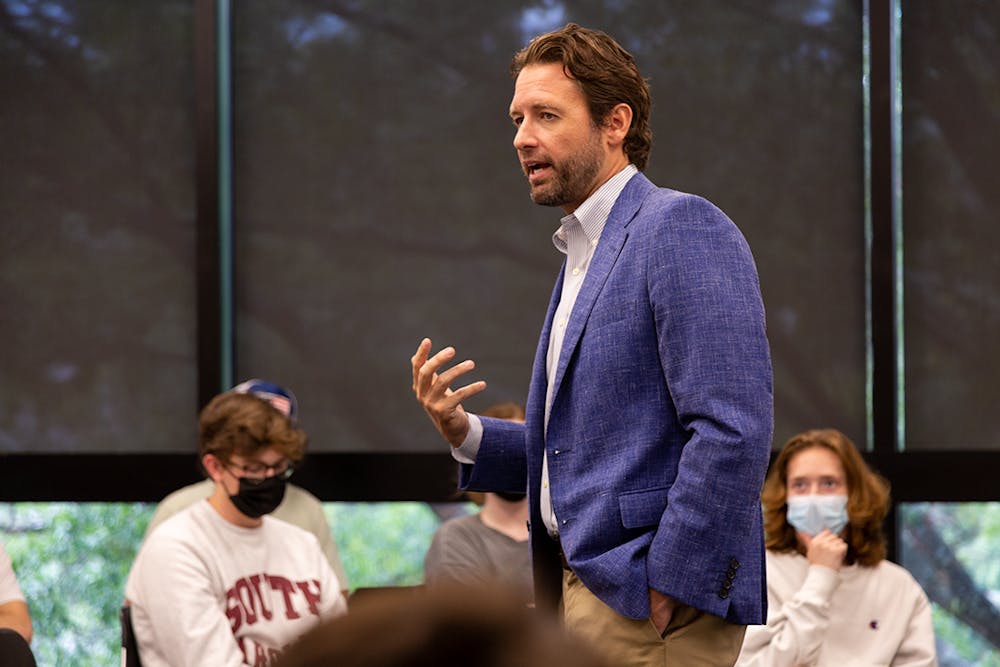The USC students and staff who attended Joe Cunningham’s event in Russell House last Wednesday had something in common with the former congressman: They won’t be the next governor of South Carolina. Cunningham has no reasonable path to victory in a statewide race against an incumbent Republican.
Of course, Cunningham did his best to dissuade the audience of this idea.
Throughout his speech, he made the case he had a shot at taking the Governor’s Mansion in 2022. He brought up examples of Democratic governors in Republican states, such as Louisiana, and the fact he flipped South Carolina’s first Congressional District from red to blue in 2018.
However, one-off success in a coastal congressional district doesn’t necessarily translate to statewide success.
Additionally, Cunningham’s success came in South Carolina's First Congressional District, which is more Democratic than South Carolina is as a whole, according to FiveThirtyEight. Now, unlike the elections in 2018 and 2020, Cunningham has to compete in Republican counties such as Lexington, Greenville and Horry instead of being able to focus on relatively liberal Charleston.
Furthermore, South Carolina is known for being a red state. In 2020, Donald Trump beat Joe Biden by 12 points in South Carolina, and in the 2018 gubernatorial race, Gov. Henry McMaster beat his Democratic rival James Smith by 8 points.
Of course, nothing is impossible when it comes to politics, but to beat the odds a candidate needs to be special, to push past their statistical disadvantages and to convert unlikely voters.
Cunningham isn’t that kind of candidate.
He won his congressional race mostly because the GOP nominated a pro-offshore drilling candidate after a split primary race, and even with the historic Democratic “blue wave” in 2018, he only managed to get 50.7% of the vote. When the Republicans nominated a stronger candidate in 2020, he lost despite having the benefit of incumbency.
Thanks to his congressional experience and national profile, Cunningham might be a better gubernatorial candidate than Smith was in 2018. Regardless, Cunningham is still an uninspiring centrist policy-wise.
The “Ending the Assault on Women’s Rights” section of his website doesn’t even include the word “abortion,” even though it’s clearly alluding to it.
When a student asked a question at the Russell House rally about flooding in Charleston, Cunningham vaguely spoke about the "long-term" need to "follow the science," but he never actually talked about climate change.
The “Better Jobs and Higher Wages” section of his website only calls for raising the state minimum wage to $12 an hour, even though a living wage for a single adult in South Carolina with no children is $14.58, according to MIT.
Cunningham didn't mention any plans for housing, despite South Carolina having the highest eviction rate in the country. (The city of North Charleston has the highest eviction rate of any American city, and Columbia isn’t far behind in eighth place.)
His stance to legalize marijuana seems to be a focal point of his campaign. However, It didn’t go over quite as planned at USC; when he brought it up during the Russell House rally, he took a pause for applause, which went unanswered until his Jeb Bush-esque comment of, “I thought that I might get an applause on that."
At the end of the day, Cunningham might not even get a chance to face off against McMaster. He still has to win the Democratic nomination, and he has real competition in the form of Mia McLeod, a state senator who is the first Black woman to run for governor in South Carolina's history.
If any of these Democrats want to run a respectable campaign against McMaster, they need to drop the centrist charade and run a no-holds-barred campaign fueled by concrete and radical ideas.
They’d probably still lose, but at least it’d be fun.

